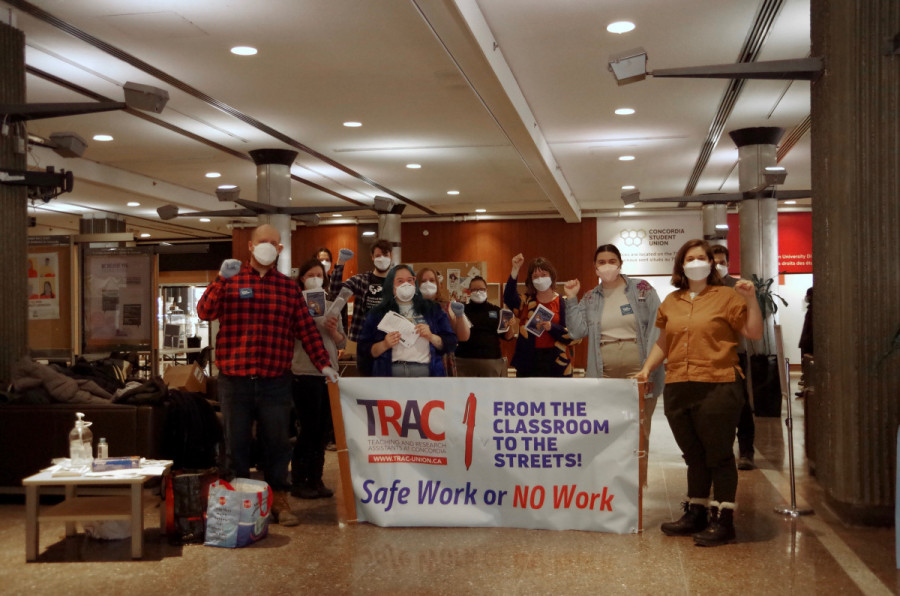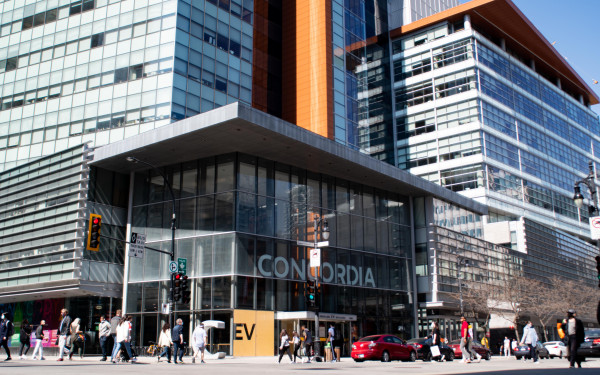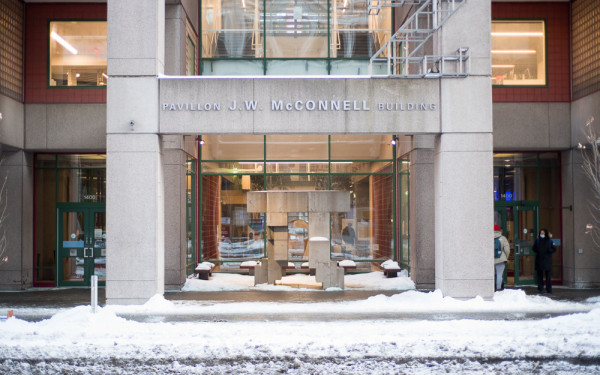Teaching and Research Assistants at Concordia protest and distribute N95 masks in unsafe return to campus
Union urges tighter health measures, more online accomodations to curb Omicron
Members of the Teaching and Research Assistants at Concordia union gathered in Hall Building atrium on Feb. 3, to protest against the current return to campus plan from Concordia.
The group reiterated their demands published in an open letter to Concordia: that a full in person return be delayed, and for the university to provide students and faculty with N95 masks.
The protest commenced at 11 a.m. and saw approximately a dozen volunteers associated with TRAC distribute N95 masks to students and faculty passing by. Flyers containing a link to TRAC’s petition reasserting their demands were also handed out, as were pamphlets outlining resources on how students could become involved in protesting this return to campus plan.
These actions were undertaken following the university’s dismissal of TRAC’s demands, as well as similar ones expressed by the Concordia Student Union and Concordia University Faculty Association in their respective open letters.
Tom MacMillan, mobilization officer at TRAC, explained the main goal with these protests was to provide TRAC’s membership of 3000+ with N95 masks. An internal survey of these members–which includes every TA at Concordia–revealed that 88 per cent were hesitant to return to in-person education without N95 masks and sought broader online learning options.
According to TRAC organizers, administrative staff explained to them in a Jan. 31 meeting that N95 masks create a false sense of security, requiring proper fitting that’s difficult to enforce.
In an email to The Link, Concordia VP of Communications Vannina Maestracci explained that this decision remains in line with official Public Health requirements for the educational sector. She added that in order to provide N95 masks, the university must adhere to safety regulations.
“[Regulations] must be respected, including product selection (some respirators on the market do not meet Health Canada standards for N95-level protection), medical clearance to wear respiratory protection, fit-testing to ensure the N95 provided is properly fitted and training on how to properly wear a N95,” she said.
Responding to Concordia’s initial explanation, MacMillan said he thinks this is inadequate given the assertions by public health authorities that N95s better protect against the Omicron variant.
“At the very least we should be wearing the proper masks that health experts have said over and over again [are] much more effective against Omicron than the blue procedural ones,” he said. “We feel that the solution of wearing the blue masks, while better than no masks, is insufficient for the current variant.”
MacMillan added TRAC hopes the protests will draw students to sign their petition demanding a safer return to campus.
Bree Stuart, president of TRAC, was also present and expressed the union’s frustration over the university’s lack of social distancing and contact tracing policies.
“What we've heard back [from the administration] is that they're following public health guidelines. But we don't think that's enough because the government has missed the mark several times during the COVID pandemic,” she said.
Stuart explained that TRAC has partnered with the CSU to develop a contact tracing procedure of their own to implement on campus.
“These are really the jobs of the university, and the unions are stepping in because Concordia is failing at doing its job,” she said.
Stuart and MacMillan both emphasized that TRAC is not against a return to in-person campus in general, only under the current plan undertaken by Concordia.
“We have way more infections, way more hospitalizations than we did when the university closed down two years ago, and stayed closed for over a year,” said Stuart. “At the barest minimum, everyone who's on campus should be wearing proper masks and social distancing.”
Stuart added that Concordia could further mitigate this unsafe environment by allowing greater flexibility for students who wish to continue online learning. Seminar and discussion groups, she suggested, could have fully online or hybrid options.
“We feel like there's not good enough reasoning to force people on campus who don't need to be,” she said.
Max Jones, a TA at Concordia’s English department, said that he and many of his peers and students were wary of Concordia’s in-person roll out. He explained half an hour was spent in one of the classes he teaches discussing his students’ anxieties over the lack of safety measures.
For Jones, a campus with stricter safety protocols and/or a continuation of online or hybrid learning is a small sacrifice to give.
“We miss saying hello to people, but we want to be able to do it in a way that’s safe and in a way that doesn't have us back online in a month or making our friends vulnerable and families less safe.”
From files by Stella Mazurek.





_600_375_90_s_c1.jpg)

